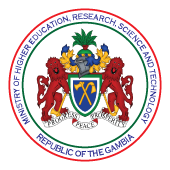
About Science Technology and Innovation (STI)
The Directorate of Science, Technology and Innovation has policy oversight function over Science, Technology, and Innovation and related matters in The Gambia, providing administrative, coordination, and management to governmental and private sectors, civil society, and inter-governmental agencies.
The Directorate supports the institutional capacities in the area of Science, Technology, Engineering and Mathematics (STEM) and related fields through the provision of appropriate infrastruture and equipment and training.
Additionally, the Directorate promotes the utilization and assimilation of ICT by institutions through the innovation and enterpreneuriship hubs as well as introducing entrepreneurship as part of national curriculum.
Mandate
- Develop and implement policies, strategies, and programs to promote science, technology, and innovation in The Gambia, aligning them with national development goals and priorities.
- Promote STEM (Science, Technology, Engineering, and Mathematics) education at all levels, fostering interest and capacity in these fields among students and teachers.
- Foster a culture of scientific, technological advancement, and innovation within the country.
- Facilitate the transfer of technology and knowledge between research institutions, academia, and industry, ensuring their effective application in economic and social development.
- Promote and support entrepreneurship and startup initiatives in science and technology sectors, providing guidance, resources, and access to funding opportunities.
- Develop and maintain strategic partnerships with national and international organizations, fostering collaboration and leveraging resources for research and innovation.
- Coordinate the establishment and management of science and technology parks, innovation hubs, and incubators, providing an enabling environment for innovation and commercialization of research outcomes.
- Support the development and implementation of policies and regulations related to intellectual property rights, and technology transfer.
- Facilitate the establishment and management of innovation and enterpreneurial hubs, promoting creativity and business development
- Promote the commercialization of research and innovation outcomes,
- Conduct regular monitoring and evaluation of science, technology, and innovation programs and initiatives, measuring their impact and identifying areas for improvement.
- Provide guidance and support to scientists, researchers, innovators, and entrepreneurs in accessing funding opportunities, grants, and scholarships.
- Collaborate with relevant government agencies, industry associations, and international partners to address the technological and innovation needs of priority sectors.
- Conduct advocacy on the importance of science, technology, and innovation in national development.
- In collaboration with the Directorate of Tertiary and Higher Education, to foster partnerships between tertiary institutions, industry, and relevant stakeholders to enhance the employability and entrepreneurship skills of graduates.
- Support the effective implementation of the National Research and Innovation Fund.
Our Mission
To build and strengthen national capacity and competencies in STI that will enhance the attainment of economic development and national competitiveness.
Guiding Principles in Research & Development
To provide direction in the nation‘s quest to achieve the full benefits of STI, the following guiding principles should be adhered to:
Commitment
It is necessary to ensure that there is full and unabridged national commitment to STI that translates into solid investments by both the public and private sectors and the widespread adoption of technologies for socio-economic development.
Concentration
It is important to ensure full and maximum utilization of the country‘s scarce resources in strategic priority areas. Efforts must be focused on those sectors where the nation‘s greatest strengths lie and where the opportunities for growth and leadership are highest.
Capacity
It is necessary to strengthen the nation's capacity and capability to effectively engage STI as a tool for wealth creation and social well-being through education, expansion and upgrading of the STI infrastructure.
To Encourage Institutional And Individual Capacity Building To Acquire A Critical Mass Of Researchers In The Country
Government will encourage institutions and, where feasible, provide support for them to increase the number of academic staff with doctorate degrees to improve the volume and quality of research carried out in the country.
Collaboration
The promotion of smart partnerships and synergies between civil society, research institutions, universities and industries will enhance the success of this policy.
Commercialization
It is necessary to enhance the nation's ability to commercialize national products, processes, services and outputs of research and innovations that meet market demands in a competitive way through the adoption of an aggressive export –oriented strategy.
Culture
It is essential to foster a culture that promotes creativity, innovation and entrepreneurship in STI through the creation of an environment that rewards market-driven ideas, supports science and innovation and inspires interest in STI indigenous technology careers.
Community Participation
The enhancement of community support, appreciation and active participation in STI development relevant to their daily lives and in accordance with acceptable national cultural norms, ethics and practices is essential.

